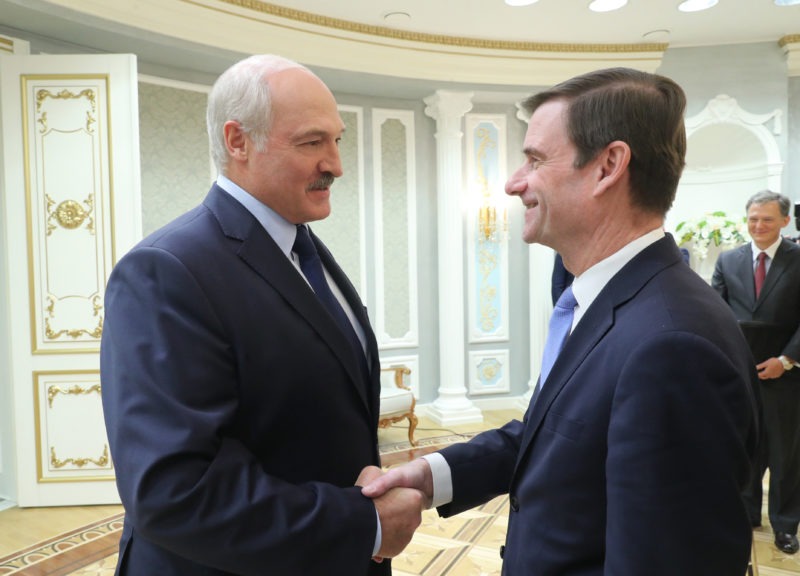US, Belarus to restore envoys after 10-year freeze
Belarusian President Alexander Lukashenko meets with US Undersecretary for Political Affairs David Hale in Minsk on September 17 (Nikolay PETROV)
Minsk (AFP) – The United States and Belarus are preparing to exchange ambassadors after more than a decade-long freeze, a senior US diplomat said on Tuesday.
US Undersecretary for Political Affairs David Hale met with Belarusian President Alexander Lukashenko as Washington looks to improve ties with the isolated regime in Minsk.
In a statement released by the US embassy after the talks, Hale said US-Belarus relations were at a “historic juncture”.
“It is my honour to announce that we are prepared to exchange ambassadors as the next step in normalising our relationship,” he said.
Hale did not say when the ambassadors, who were withdrawn from both capitals in 2008 in a row over sanctions, might return.
Washington eased sanctions against Belarus in 2016.
Hale said that if Minsk shows more progress during upcoming parliamentary and presidential elections “we can discuss further easing of sanctions”.
Belarus will hold parliamentary elections this year and presidential polls in 2020.
Often dubbed “Europe’s last dictatorship”, Belarus has been the target of Western sanctions over its poor rights record and lack of fair elections.
Hale also pointed out that Washington did not ask Belarus “to choose between East and West,” saying it respected Belarus’s “desire to chart its own course”.
The 65-year-old Lukashenko is a key ally of Russian President Vladimir Putin and Belarus’s improvement in ties with Washington comes amid apparent Kremlin pressure for closer ties between Moscow and Minsk.
– ‘New chapter’ in ties –
During the talks with Hale on Tuesday, Lukashenko also said he wanted to improve ties with Washington.
“We will do everything for our relations to develop,” he said in comments released by his office.
He praised Washington’s interest in Belarus and alluded to the two countries’ common victory over the Nazis in World War II.
“It is not normal when two countries which used to fight together against the enemy today have weak ties,” Lukashenko said.
Hale’s visit follows a trip to Belarus last month by then-national security advisor John Bolton aimed at improving US relations with Minsk.
Lukashenko said then that he was looking to open a “new chapter” in ties with Washington.
The rapprochement with the United States comes as Moscow is pressuring Minsk into closer integration.
The idea has been repeatedly discussed since Putin’s re-election last year, with some seeing unification with Belarus as a way for the longtime Russian leader to circumvent his country’s constitutional term limits.
Russia is Belarus’s closest ally and the two have formed a nominal “union” with close trade and military cooperation while arguing over sticking points such as energy prices and import duties.
Establishing a unified state with Belarus could possibly extend Putin’s time in power when his fourth presidential term ends in 2024 by making him the head of a new “unified” state including Belarus.
Lukashenko, a Soviet-era collective farm chief who become Belarus’s first post-independence president, has welcomed closer ties but pushed back at the idea of unification.
Moscow has denied that outright unification is on the cards.
Disclaimer: Validity of the above story is for 7 Days from original date of publishing. Source: AFP.


